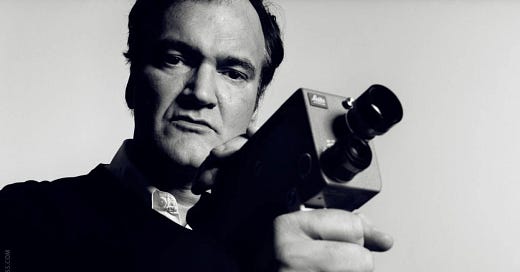Imagine a world without Tarantino movies—one without Pulp Fiction, Kill Bill, or Inglourious Basterds. Devastating, right? Yet, this almost became a reality. During the late 1980s, Tarantino ‘fell asleep’ creatively. Though he figured he would eventually get around to filmmaking, he enjoyed his life working at Video Archives, a video rental store in Manhattan Beach, South Los Angeles. His life was comfortable. He spent his days watching movies, chatting about them, and hanging out with friends. It wasn’t Hollywood, he wasn’t making films, but it felt close enough to his dream.
It wasn’t until a late-night rant from his housemate, Stevo, that he got his fire back and decided to take action.
The Midnight Rant That Changed Everything
Stevo was nearly five years older than Tarantino. As he approached thirty, Quentin noticed a change. All of a sudden his hilarious friend turned bitter and resentful. He wasn’t as funny anymore and made a point to hang out with his old high school friends. Then, one night, while hanging out in their apartment behind the store—nicknamed “The Dude House”—Stevo launched into a rant that would change Tarantino’s life.
“You know, Quentin, you think we’re this really great team, this great crew.”
“Well, we are, aren’t we?” Quentin replied.
“Quentin, at twenty, I worked at South Bay Cinemas, and I hung out with a bunch of guys, just like you. Then I stopped working at South Bay Cinemas, and I worked at Miller’s Outpost, and I hung out, with a bunch of guys, just like you. And we did everything together, just like we do. Then, I worked at Liquorice Pizza, for four years, and I hung out, with a bunch of guys, just like you!
“I’ve wasted my life, hanging out, with a bunch of guys, just like you! And they all go away!”
This guy’s telling the truth, Tarantino thought. Through Stevo, he could peer into the bleak picture of his future. If he carried on as he was, this would be his life.
The Turning Point
Quentin, like Stevo, was grappling with a sense of dissatisfaction. He was turning 25 and ruminating on what little he had achieved. He routinely engaged in what he called a “Quentin Detest Fest”, where he stayed up all night breaking down everything wrong in his life and deciding what to do about it. But before that evening, he would wake up after his all-nighter, forget all about it, and slide back into his comfortable routine. Stevo’s rant, however, changed that.
Shortly after, during another “Detest Fest”, he realised the problem: he lived too far away from Hollywood to immerse himself in the film industry. He needed to move out of the South Bay and get closer to the action. While an apartment in Hollywood was out of reach, he could afford Korea Town, a nearby neighbourhood, and that was close enough.
Within months, Tarantino quit his job and moved to Korea Town. Almost instantly, he met writers, directors and producers of low-budget horror movies. These encounters were a revelation: If these guys can do it, so can I, he thought. Soon after, opportunities presented themselves, and within a year and a half, he was making a living polishing and re-writing scripts, leading to his break in 1992 with Reservoir Dogs. The rest, of course, is history.
The Region Beta Paradox: Why Comfort Can Hold You Back
While Tarantino’s story is entertaining, it also highlights a profound truth about human behaviour. Change often occurs only when the pain of staying the same outweighs the fear of failure. This aligns with the Region Beta Paradox, a concept in behavioural science.
Introduced by Dan Gilbert, the paradox states that people are more likely to recover from intense stress than from milder discomfort. In a non-ideal yet tolerable situation, we’re less motivated to act. However, when things become truly unbearable, we’re pushed to make a change—and paradoxically, we often reach our goals faster.
For Tarantino, working at Video Archives wasn’t his dream, but it wasn’t bad enough to quit. Stevo’s rant made the future unbearable, spurring him to act.
Sometimes, a bad situation is better than a good one.
Geography Matters
Tarantino’s decision to move closer to Hollywood underscores another crucial lesson: where you live shapes your success. Quentin wasn’t going to make Reservoir Dogs pissing about in a laid-back L.A. suburb. He needed to move to Hollywood to surround himself with the right people. As angel investor Naval Ravikant puts it, “Where you live is the single most important decision you will make.”
History offers countless examples of individuals whose location shaped their destiny:
Jimi Hendrix: In 1966, Hendrix moved to London, the epicentre of rock and roll, where he stunned peers like Eric Clapton and gained the connections that launched his career.
Michelangelo: As a teenager, Michelangelo moved to Florence, Italy’s hub of art and learning, where he apprenticed with masters and later created iconic works like David and the Sistine Chapel ceiling.
Ray Dalio: The legendary hedge fund manager grew up caddying at a Manhasset golf course, where wealthy Wall Street professionals mentored him, leading to his first job in finance.
Final Thoughts
Are you too comfortable? Are you living in the wrong place? Reflect on your situation and consider the cost of inaction. Tarantino’s epiphany reminds us that discomfort, while painful, can be the catalyst for greatness. Sometimes, stepping out of your comfort zone is the only way to achieve your dreams.
Tarantino tells the story here. He begins around the 40-minute mark.




